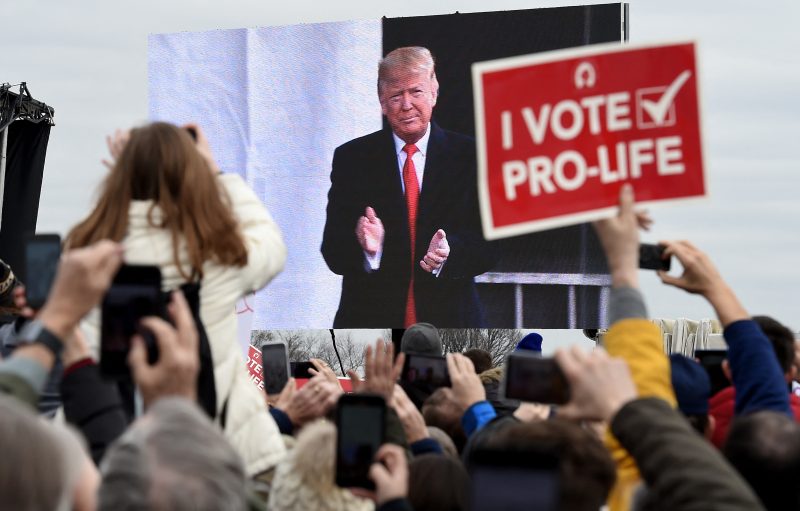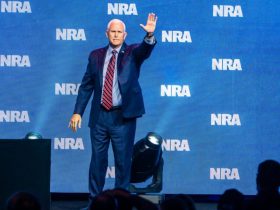Donald Trump would like you to know that he has decided not to take much of a position at all on abortion restrictions.
And he would also like you to know that he is punting on this issue for transparently political reasons.
Trump on Monday morning released a video laying out his thinking, as promised. But after a year of Trump hemming and hawing, the video adds little clarity on where he actually stands on abortion rights or restrictions.
If the video contains news at all, it’s that Trump has reverted to saying this is a state issue, after flirting with a 15-week federal ban. But Trump does not say how many weeks he’d recommend for state abortion bans; he only outlines support for exceptions to abortion bans for rape, incest and the life of the mother, and says babies should not be killed after birth (they aren’t).
Trump’s language is also fuzzy enough that it’s not clear he even opposes a federal ban. He merely says his “view” is that “the states will determine by vote or legislation or perhaps both, and whatever they decide must be the law of the land.” That could be understood as his summarizing the current situation, given there’s been no federal action that would supersede states.
It’s a remarkable microcosm of just how frightened the Republican Party is of its newfound ability to restrict abortion rights, after the Supreme Court overturned Roe v. Wade in 2022. Just days ago, the national GOP’s preferred Senate candidate in Wisconsin — a swing state — said he supported protecting abortion rights “early on in a pregnancy,” a position once unthinkable in the modern Republican Party. Now the GOP’s presumptive presidential nominee is basically trying to wash his hands of the issue.
We’re a long way from decades of Republican messaging that abortion is murder.
And as Trump has arrived at his “position,” he has made it pretty clear why he’s doing it.
“You must follow your heart on this issue, but remember: You must also win elections,” Trump says in the video.
In a social media post previewing the video Sunday night, Trump added that “we must use common sense in realizing that we have an obligation to the salvation of our Nation … TO WIN ELECTIONS, without which we will have nothing other than failure, death, and destruction.”
During a Fox News town hall this year, Trump responded to a woman urging him not to compromise on abortion rights by saying four times that the GOP needs to “win elections.”
“I love where you are coming from,” Trump told the woman. “But we still have to win elections.”
Translation: I can’t say what you want me to say, because it would be politically unwise.
Credit for transparency, at least. It’s as if Bill Clinton came out and just said, “I’m triangulating.” Or as if Barack Obama told Russia’s president in a news conference, rather than on a hot mic, that he would have “more flexibility” after the election.
Abortion rights supporters see in Trump’s comments a wink and a nod to the antiabortion movement — an implication that he’ll still do its bidding if he’s elected but that he can’t just come out and say that. And maybe so.
But this is also an issue on which the formerly “very pro-choice” Trump has evolved in a politically expedient way before. That suggests he might indeed toss the movement under the bus to the extent he thinks that’s the right political call. Trump’s guiding light, after all, is what’s good for Trump.
It’s also important to note that antiabortion groups are increasingly fighting a losing public relations battle. And having the leader of the conservative movement — who last year called six-week abortion bans “terrible” — decline to push its line right now is significant. It sends a signal to other Republicans that maybe they, too, had better move away from the hard right.
It’s also not as if a federal abortion ban is anywhere close to being able to pass in Congress; Trump’s keeping the idea at arm’s length could well serve to extinguish that idea.
For now, Trump’s position appears to be a politically expedient one.
A KFF poll in February showed that just 19 percent of Americans wanted a federal law prohibiting abortion nationwide. Fully 8 in 10 preferred either federal protections (55 percent) or for the federal government to take no action (25 percent).
A CNN poll last year showed that just 34 percent of those who approved of the Supreme Court overturning Roe wanted politicians to push for nationwide restrictions; 66 percent preferred leaving it to the states, as Trump says he would.
But it’s one thing to say it’s a state issue; it’s another not to even say what those states should do.
Trump’s home state of Florida has a six-week ban — the one the former president once called “terrible” — and voters there will decide this November whether to reject that and to enshrine abortion rights into law. This will literally be an issue on which Trump needs to make a voting decision, and he’s apparently going to try to avoid saying what decision he’ll make.
Whatever you think about Trump’s true intentions, it shouldn’t be lost that he just confirmed how radioactive this issue is for his party. And if antiabortion groups give him a pass and allow him to maintain this posture, it will be a significant setback for a movement that is already losing huge ground politically.








